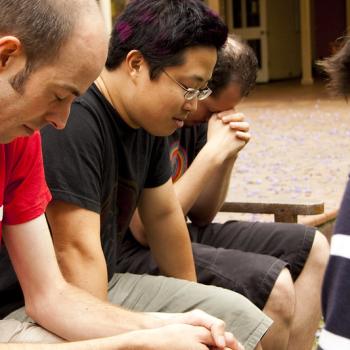In November, "Faithful Citizenship" is exploring the problem of hunger around the world and at home, with the ONE movement's campaign against famine as an organizing focus—and our festive celebration of Thanksgiving as contrast.
Admit it.
When I remind you (or inform you!) that the Horn of Africa is currently suffering a devastating famine—described by TIME as the world's worst—there's a part of you that either yawns or slaps your palm to your forehead and says, "What? Again!"
Maybe you took action back when you heard Band Aid's call to feed the world "Do They Know It's Christmas" in 1984. Maybe you gave money to LiveAid or were somehow inspired by USA for Africa's "We Are the World" in 1985. Maybe you were moved enough to care by one of the various high-profile events in the decades since. Maybe you've sponsored a child through Save the Children, or even adopted an orphan from one of the world's poorest countries.
You're one of those good-hearted people who've done something.
But honestly, aren't you tired of people starving in Africa?
The media clearly are. As ONE's Adam Phillips pointed out in our interview last week, there is a degree of media fatigue—and focus on the financial problems challenging the developed world—that keeps the major media from getting the message out as strongly as they might. A September study from the Pew Research Center's Project for Excellence in Journalism notes that year to date, famine news had accounted for just 0.2 percent of total news coverage. (Compare that with a recent analysis that found the economy accounting for 19 percent of the newshole, and even the trial of Michael Jackson's doctor receiving 3 percent, or fifteen times the coverage of the African disaster!)
Jesus told his followers in Mark 14:7, "For you always have the poor with you, and you can show kindness to them whenever you wish; but you will not always have me." Although the verse sometimes encourages people not to do anything about the poor, obviously that's not what I want to advocate here.
But let's tell the truth.
Always is one of the most exhausting words I know.
And the prospect that we will be forever asked to care for people we don't even know, people on the other side of the world, is, first, exhausting, and then, off-putting. Why should we be asked to help—again?
Why is this even my problem?
I've got several responses to that as we consider the question of helping others across the globe, whether individually, through churches or charities, or through national policy. Some are logical, some are theological; all point to action now.
The first is, admittedly, pragmatic and completely self-serving: desperate people are dangerous. As Kofi Annan said last week at Stanford University, negative food security is linked to social unrest, refugee migrations, and political instability. There is a reason the Roman Empire passed out bread (along with its circuses) to the urban poor; if my family is starving, there is nothing I will not do to feed them, and my anger at being left to die will boil over into the world. It is in the long-term interest of the West and the world's wealthy to help feed people in the world's poorest regions so that they don't become unstable nations (look at the problems the un-governed Somalia has caused) or a breeding ground for terrorists.
Second, both pragmatically and other-serving: we now know enough about food supply, weather patterns, and agriculture that we can actually help prevent future famines, diminish the tragedy of hunger, and correspondingly reduce the need for humanitarian interventions. As ONE points out in a position paper on agricultural aid, our investments now in agricultural sustainability have amazing effect. One dollar invested in agriculture can prevent the need for at least ten dollars in humanitarian aid in the following year.





